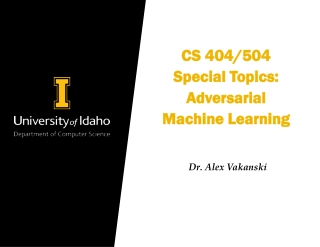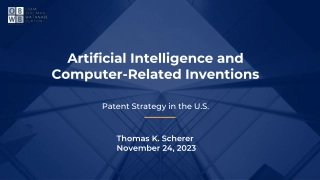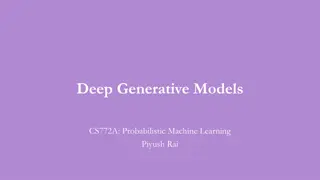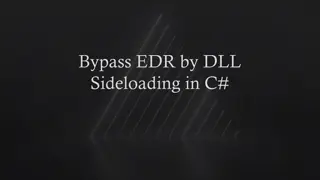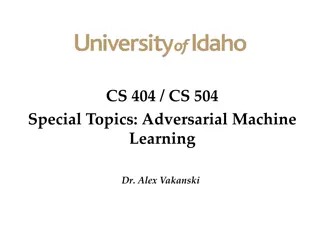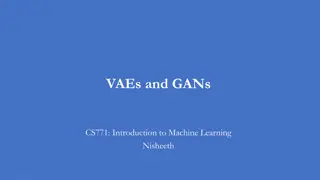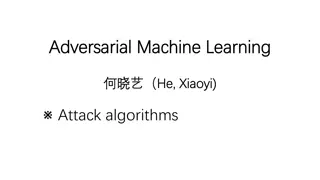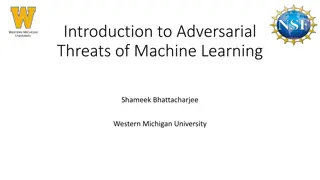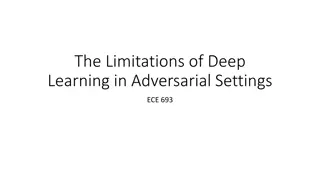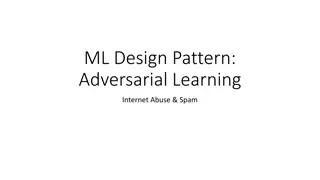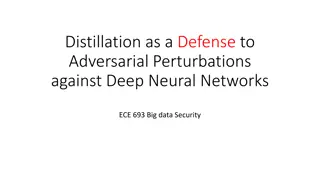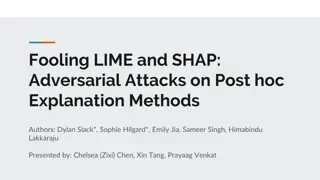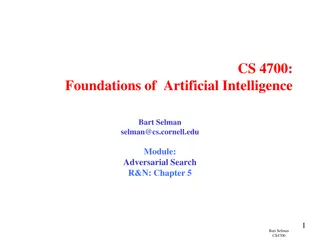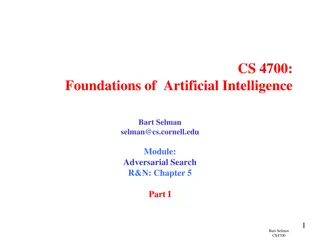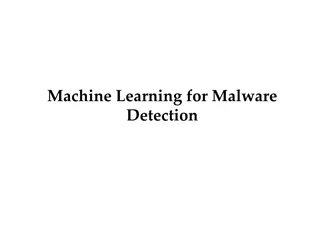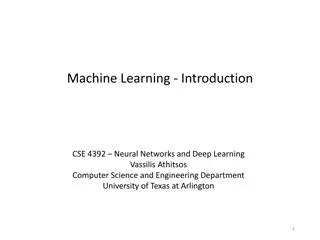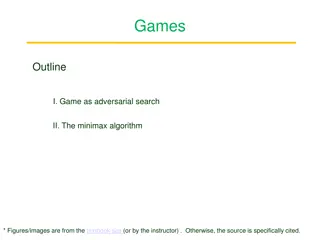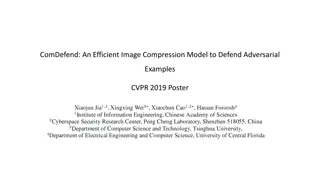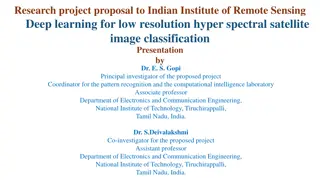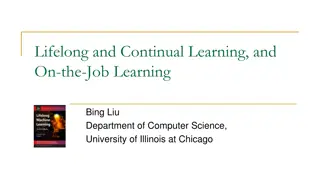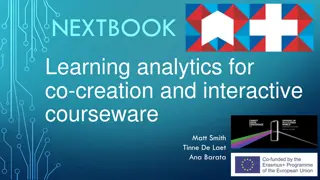Adversarial Machine Learning
Evasion attacks on black-box machine learning models, including query-based attacks, transfer-based attacks, and zero queries attacks. Explore various attack methods and their effectiveness against different defenses.
21 views • 60 slides
Data Augmentation Techniques for Deep Learning-Based Medical Image Analyses
Various data augmentation techniques for improving deep learning-based medical image analyses. It covers topics such as overfitting, data labeling, and the use of generative adversarial networks (GANs).
2 views • 14 slides
Adversarial Machine Learning in Cybersecurity: Challenges and Defenses
Adversarial Machine Learning (AML) plays a crucial role in cybersecurity as security analysts combat continually evolving attack strategies by malicious adversaries. ML models are increasingly utilized to address the complexity of cyber threats, yet they are susceptible to adversarial attacks. Inves
2 views • 46 slides
CS 404/504 Special Topics
Adversarial machine learning techniques in text and audio data involve generating manipulated samples to mislead models. Text attacks often involve word replacements or additions to alter the meaning while maintaining human readability. Various strategies are used to create adversarial text examples
1 views • 57 slides
A Family Safeguarding Approach for Children in Care
Families often come into contact with children's social care due to parenting under adversarial conditions rather than causing harm. The need for a change in vision and values underpinning family safeguarding duties is crucial, emphasizing the importance of helping families raise their children. Lad
1 views • 25 slides
Artificial Intelligence and Computer-Related Inventions
Explore the key concepts and techniques in the field of artificial intelligence (AI), including supervised learning, unsupervised learning, reinforcement learning, deep learning, and generative adversarial networks. Gain insights into the evolving definitions of intelligence in machines and the pote
4 views • 13 slides
Understanding Deep Generative Models in Probabilistic Machine Learning
This content explores various deep generative models such as Variational Autoencoders and Generative Adversarial Networks used in Probabilistic Machine Learning. It discusses the construction of generative models using neural networks and Gaussian processes, with a focus on techniques like VAEs and
9 views • 18 slides
Do Input Gradients Highlight Discriminative Features?
Instance-specific explanations of model predictions through input gradients are explored in this study. The key contributions include a novel evaluation framework, DiffROAR, to assess the impact of input gradient magnitudes on predictions. The study challenges Assumption (A) and delves into feature
0 views • 32 slides
Understanding DLL Sideloading Techniques in C#
Explore bypassing EDR using DLL sideloading in C#, finding a vulnerable EXE, testing with OleView.exe, inspecting original DLL functionality, and writing DLL exports in C# for adversarial security testing.
0 views • 19 slides
Understanding Clinician Testimony in Legal Proceedings
This presentation by William H. Reid, MD, MPH provides insights for clinicians testifying in civil and criminal cases. It covers legal processes, ethical considerations, and principles of testimony. The content also distinguishes between expert and ordinary witness roles, and highlights the adversar
0 views • 41 slides
Exploring Adversarial Machine Learning in Cybersecurity
Adversarial Machine Learning (AML) is a critical aspect of cybersecurity, addressing the complexity of evolving cyber threats. Security analysts and adversaries engage in a perpetual battle, with adversaries constantly innovating to evade defenses. Machine Learning models offer promise in combating
0 views • 43 slides
Understanding Domain Adaptation in Machine Learning
Domain adaptation in machine learning involves transferring knowledge from one domain to another. It addresses the challenge of different data distributions in training and testing sets, leading to improved model performance. Techniques like domain adversarial training and transfer learning play a k
0 views • 16 slides
Experiential Learning Portfolio Program at Barry University
Experiential Learning Portfolio Program at Barry University's School of Professional and Career Education (PACE) offers a unique opportunity to earn college credit for learning gained from work and community service experiences. Through this program, students can showcase their experiential learning
0 views • 16 slides
Variational Autoencoders (VAEs) and Generative Adversarial Networks (GANs) in Machine Learning
Introduction to Generative Models with Latent Variables, including Gaussian Mixture Models and the general principle of generation in data encoding. Exploring the creation of flexible encoders and the basic premise of variational autoencoders. Concepts of VAEs in practice, emphasizing efficient samp
0 views • 19 slides
Innovative Learning Management System - LAMS at Belgrade Metropolitan University
Belgrade Metropolitan University (BMU) utilizes the Learning Activity Management System (LAMS) to enhance the learning process by integrating learning objects with various activities. This system allows for complex learning processes, mixing learning objects with LAMS activities effectively. The pro
4 views • 16 slides
Understanding Adversarial Attacks in Machine Learning
Adversarial attacks in machine learning aim to investigate the robustness and fault tolerance of models, introduced by Aleksander Madry in ICML 2018. This defensive topic contrasts with offensive adversarial examples, which seek to misclassify ML models. Techniques like Deep-Fool are recognized for
0 views • 29 slides
Understanding Adversarial Machine Learning Attacks
Adversarial Machine Learning (AML) involves attacks on machine learning models by manipulating input data to deceive the model into making incorrect predictions. This includes creating adversarial examples, understanding attack algorithms, distance metrics, and optimization problems like L-BFGS. Var
0 views • 88 slides
Understanding Adversarial Threats in Machine Learning
This document explores the world of adversarial threats in machine learning, covering topics such as attack nomenclature, dimensions in adversarial learning, influence dimension, causative and exploratory approaches in attacks, and more. It delves into how adversaries manipulate data or models to co
0 views • 10 slides
Limitations of Deep Learning in Adversarial Settings
Deep learning, particularly deep neural networks (DNNs), has revolutionized machine learning with its high accuracy rates. However, in adversarial settings, adversaries can manipulate DNNs by crafting adversarial samples to force misclassification. Such attacks pose risks in various applications, in
0 views • 38 slides
Adversarial Risk Analysis for Urban Security
Adversarial Risk Analysis for Urban Security is a framework aimed at managing risks from the actions of intelligent adversaries in urban security scenarios. The framework employs a Defend-Attack-Defend model where two intelligent players, a Defender and an Attacker, engage in sequential moves, with
1 views • 26 slides
Adversarial Learning in ML: Combatting Internet Abuse & Spam
Explore the realm of adversarial learning in ML through combating internet abuse and spam. Delve into the motivations of abusers, closed-loop approaches, risks of training on test data, and tactics used by spammers. Understand the challenges and strategies involved in filtering out malicious content
0 views • 13 slides
Distillation as a Defense Against Adversarial Perturbations in Deep Neural Networks
Deep Learning has shown great performance in various machine learning tasks, especially classification. However, adversarial samples can manipulate neural networks into misclassifying inputs, posing serious risks such as autonomous vehicle accidents. Distillation, a training technique, is proposed a
3 views • 31 slides
Understanding Robustness to Adversarial Examples in Machine Learning
Explore the vulnerability of machine learning models to adversarial examples, including speculative explanations and the importance of linear behavior. Learn about fast gradient sign methods, adversarial training of deep networks, and overcoming vulnerabilities. Discover how linear perturbations imp
0 views • 37 slides
Adversarial Attacks on Post-hoc Explanation Methods in Machine Learning
The study explores adversarial attacks on post-hoc explanation methods like LIME and SHAP in machine learning, highlighting the challenges in interpreting and trusting complex ML models. It introduces a framework to mask discriminatory biases in black box classifiers, demonstrating the limitations o
2 views • 18 slides
Understanding Game Playing and Adversarial Search at University of Berkeley
Delve into the realm of game playing and adversarial search at the University of Berkeley to understand the complexities of multi-agent environments. Explore the concepts of competitive MA environments, different kinds of games, and the strategic decision-making processes involved in two-player game
0 views • 81 slides
Understanding Zero-Shot Adversarial Robustness for Large-Scale Models
Pretrained large-scale vision-language models like CLIP show strong generalization on unseen tasks but are vulnerable to imperceptible adversarial perturbations. This work delves into adapting these models for zero-shot transferability in adversarial robustness, even without specific training on unk
0 views • 18 slides
Understanding Learning in Games Seminar
Explore the intersection of Game Theory and Machine Learning in the context of Learning in Games. Discover how decision-makers adapt strategies to maximize their utility, with emphasis on Multi-Agent Learning. Topics include AI for Board Games, Equilibrium Computation in Auctions, and various soluti
0 views • 11 slides
Evaluating Adaptive Attacks on Adversarial Example Defenses
This content discusses the challenges in properly evaluating defenses against adversarial examples, highlighting the importance of adaptive evaluation methods. While consensus on strong evaluation standards is noted, many defenses are still found to be vulnerable. The work presents 13 case studies o
0 views • 9 slides
Understanding Adversarial Search in Artificial Intelligence
Adversarial search in AI involves making optimal decisions in games through concepts like minimax and pruning. It explores the strategic challenges of game-playing, from deterministic turn-taking to the complexities of multi-agent environments. The history of computer chess and the emergence of huma
0 views • 56 slides
Foundations of Artificial Intelligence: Adversarial Search and Game-Playing
Adversarial reasoning in games, particularly in the context of artificial intelligence, involves making optimal decisions in competitive environments. This module covers concepts such as minimax pruning, game theory, and the history of computer chess. It also explores the challenges in developing AI
0 views • 56 slides
Learning from Demonstration in the Wild: A Novel Approach to Behavior Learning
Learning from Demonstration (LfD) is a machine learning technique that can model complex behaviors from expert trajectories. This paper introduces a new method, Video to Behavior (ViBe), that leverages unlabelled video data to learn road user behavior from real-world settings. The study presents a v
0 views • 19 slides
Machine Learning for Cybersecurity Challenges: Addressing Adversarial Attacks and Interpretable Models
In the realm of cybersecurity, the perpetual battle between security analysts and adversaries intensifies with the increasing complexity of cyber attacks. Machine learning (ML) is increasingly utilized to combat these challenges, but vulnerable to adversarial attacks. Investigating defenses against
0 views • 41 slides
Enhancing Communication Skills Through Effective Listening and Leadership
Discover the art of effective listening, a crucial skill for building relationships, developing teams, and finding solutions. Dive into the concepts of active and empathetic listening, and explore how listening can transform adversarial situations into positive outcomes. Uncover the principles of se
0 views • 11 slides
Understanding Machine Learning: Types and Examples
Machine learning, as defined by Tom M. Mitchell, involves computers learning and improving from experience with respect to specific tasks and performance measures. There are various types of machine learning, including supervised learning, unsupervised learning, and reinforcement learning. Supervise
0 views • 40 slides
Exploring Adversarial Search and Minimax Algorithm in Games
Competitive games create conflict between agents, leading to adversarial search problems. The Minimax algorithm, used to optimize player decisions, plays a key role in analyzing strategies. Studying games offers insights into multiagent environments, economic models, and intellectual engagement. The
0 views • 17 slides
Advances in Online Learning with Vector Costs and Bandits with Knapsacks
Explore cutting-edge research on online learning algorithms dealing with vector costs and bandits, including applications in load balancing and bandits with knapsacks. The studies cover topics such as regret minimization, minimizing vector costs, and maximizing rewards while maximizing budget constr
0 views • 17 slides
Efficient Image Compression Model to Defend Adversarial Examples
ComDefend presents an innovative approach in the field of computer vision with its efficient image compression model aimed at defending against adversarial examples. By employing an end-to-end image compression model, ComDefend extracts and downscales features to enhance the robustness of neural net
0 views • 16 slides
Deep Learning for Low-Resolution Hyperspectral Satellite Image Classification
Dr. E. S. Gopi and Dr. S. Deivalakshmi propose a project at the Indian Institute of Remote Sensing to use Generative Adversarial Networks (GAN) for converting low-resolution hyperspectral images into high-resolution ones and developing a classifier for pixel-wise classification. The aim is to achiev
0 views • 25 slides
Lifelong and Continual Learning in Machine Learning
Classic machine learning has limitations such as isolated single-task learning and closed-world assumptions. Lifelong machine learning aims to overcome these limitations by enabling models to continuously learn and adapt to new data. This is crucial for dynamic environments like chatbots and self-dr
0 views • 32 slides
Enhancing Learning Through Co-Created Interactive Courseware and Learning Analytics
Explore the innovative concept of co-creation in interactive courseware and learning analytics to improve student learning outcomes. Discover how students collaborate in a social learning environment, track their progress, and engage in dialogic and constructive pedagogical strategies. Harness the p
0 views • 19 slides


